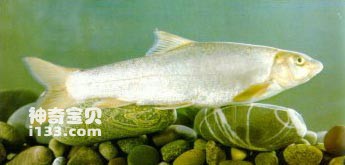Schizothorax (schizothorax.) prenanti belongs to the order Cypriniformes, family Cyprinidae, subfamily Schizothorax, genus Schizothorax, and subgenus Schizothorax. Commonly known as: Yayu, Qikou, thin turtle, Qikou fine scale fish. English name: Prenant’s schizothoracin.

Body long, slightly flattened laterally. The snout is blunt and rounded; the mouth is inferior and has a transverse cleft (slightly arc-shaped in small individuals). The front edge of the mandible has sharp horn, the lower lip is complete and crescent-shaped, with many small papillae on the surface, and the posterior labial groove is continuous. There are 2 pairs of barbels, approximately equal in length, and their length is approximately equal to the diameter of the eye. The body is covered with fine scales and arranged neatly. The pectoral fins are not exposed and have obvious scales; there are one row of large scales on both sides of the anal fin and anus; there are several large scales behind the gill openings and under the lateral line. The lateral lines are straight and transverse to the central axis of the body. The hard spines of the dorsal fin are stronger in small individuals with a body length of less than 14 cm, and their rear edges have obvious serrations; but in large individuals (with a body length of more than 15 cm), they become weak, and their rear edges are smooth or have only a few serrated marks. The back of the body is dark gray, the abdomen is silvery white, the dorsal fin, pectoral fin and pelvic fin are bluish gray, and the tail fin is red. Individuals living in Qingxi, a tributary, have small black spots on their sides, and male fish that have reached sexual maturity have pearl stars on their snouts.
Schizothorax is a bottom fish that requires a lower water temperature environment. It likes to live at the junction of rapid and slow currents and has short-distance reproductive migration. Females reach sexual maturity at age 4, and males generally reach sexual maturity at age 3. The spawning season is from March to April. At this time, the breeding population traces upstream from the Minjiang and Dadu rivers to their tributaries to lay eggs. The eggs are mostly laid on the gravel and fine sand at the bottom of the rapids, and are often washed down by water into stone caves for development. After spawning, the broodstock fish return to deep waters of rivers or underwater caves to overwinter in autumn (September-October). They feed on algae and occasionally aquatic insects, snails and plant seeds. When feeding, its tail is tilted upward, and its well-developed horny edge of the mandible is scraped from one end to the other on the rock. It is scraped and sucked, leaving obvious marks on the rock it has just scraped. Fishermen often judge it based on this. habitat. Distributed in the Minjiang River, Dadu River and other water systems, it is an important edible fish in the upper reaches of the Yangtze River. The individual is large, generally 0.5-1.0 kg, and the maximum can reach 4.0-5.0 kg. The natural output is also large. In the areas along the Minjiang River, Schizothorax and Schizothorax are the dominant species in the catch, sometimes accounting for more than 70% of the total market supply. Because the meat is plump and rich in fat, it is the most popular food among residents in the producing area. Especially "Ya'an Casserole Fish Head" is famous all over the world. According to folklore, during the Guangxu period, Li Jingfu, a son from Ya'an, paid tribute to the Empress Dowager Cixi with an "elegant fish". After Cixi ate it, she felt that the meat of dragons and phoenixes was unmatched, so she rewarded Li Jingfu as the prefect. There are a lot of natural fry of Schizothorax in the river. Using the natural fry to grow fry of suitable sizes can be used as stocking objects in small and medium-sized water bodies in the upstream areas to develop the local fish farming industry. Please note that the eggs are poisonous but can still be eaten if fully cooked.
animal tags:
We created this article in conjunction with AI technology, then made sure it was fact-checked and edited by a Animals Top editor.